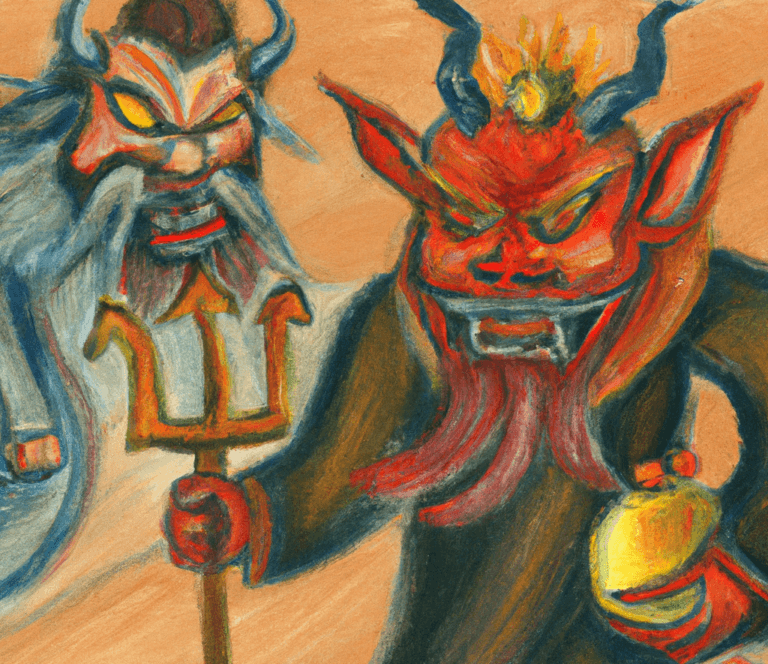Arabic Djinn, Greek Daemons, and Goetic Demons
Throughout history, various cultures have believed in the existence of supernatural entities that dwell between the realms of humans and gods. These entities have been known by different names in different cultures, but they share a common thread of being powerful and enigmatic beings. In this article, we will explore and compare three such entities: Arabic Djinn, Greek Daemons, and Goetic Demons. While they may differ in their origins and interpretations, they all captivate our imagination and embody the intricacies of human belief systems.

- Arabic Djinn: Originating from Arabian folklore, Djinn are supernatural beings made of smokeless fire. In Islamic mythology, they were created before humans and are believed to possess free will and varying degrees of power. Djinn are said to inhabit desolate places such as abandoned buildings, deserts, and ancient ruins. They are often depicted as shapeshifters, capable of taking on human or animal forms. Djinn are known for their mischievous nature, but they can also be benevolent or malevolent towards humans. They are bound by their own set of rules and can be summoned or controlled through rituals.
- Greek Daemons: In ancient Greek mythology, Daemons were spiritual beings that acted as intermediaries between gods and mortals. Unlike the malevolent connotations associated with the term “demon” in modern times, Greek Daemons were often seen as benevolent or neutral entities. They could take on various forms and were believed to guide and protect individuals, families, or even cities. Daemons were associated with specific concepts or domains, such as love, wisdom, or war. They were thought to influence human thoughts, emotions, and actions, but not necessarily control them. Daemons played a significant role in Greek religious and philosophical beliefs.
- Goetic Demons: Goetic demons are entities that emerged from medieval grimoires and occult practices. The most famous grimoire associated with Goetic demons is “The Lesser Key of Solomon,” which catalogs 72 demons. These demons were believed to have been bound by King Solomon himself and could be summoned and controlled by practitioners of ceremonial magic. Unlike Djinn and Daemons, Goetic demons are typically portrayed as malevolent entities who demand obedience and offer power or knowledge in return. They often have specific areas of expertise and can grant favors or fulfill desires, but at a great cost to the summoner.

Comparative Analysis:
While Arabic Djinn, Greek Daemons, and Goetic Demons share some similarities in their supernatural nature and interactions with humans, they also possess distinct characteristics and cultural interpretations. Djinn are deeply rooted in Islamic tradition and are often associated with the desolate and unseen aspects of the world. Greek Daemons, on the other hand, were integral to the ancient Greek belief system, acting as guiding forces in different domains of life. Goetic demons are products of occult practices and are depicted as dangerous and unpredictable beings that can be summoned and controlled.
Another significant distinction lies in the perception of these entities. Djinn and Daemons were not inherently evil or malevolent, but Goetic demons were often seen as dangerous and potentially harmful. The cultural and religious contexts in which these entities emerged influenced the way they were perceived and interacted with by humans.
The following chart compares the three types of beings discussed in this article:
| Feature | Arabic Jinn | Greek Daemons | Goetic Demons |
|---|---|---|---|
| Origin | Arabic mythology | Greek mythology | Western occultism |
| Composition | Fire | Air, earth, fire, water | Unknown |
| Nature | Can be good or evil | Can be good or evil | Can be good or evil, or dangerous |
| Abilities | Can shapeshift, can interact with humans | Can grant favors, can be dangerous | Can grant favors, can be dangerous |
| Summoning | Somewhat possible | Not possible | Possible |
Conclusion
Conclusion: Arabic Djinn, Greek Daemons, and Goetic Demons provide fascinating insights into the diverse mythologies and belief systems that have shaped human cultures throughout history. While they all embody the concept of powerful supernatural beings, their characteristics, origins, and cultural interpretations differ significantly. Exploring these entities not only sparks our imagination but also sheds light on the complex relationship between humans and the supernatural, reflecting our perennial fascination with the realms beyond our own.
